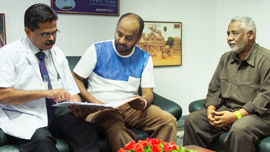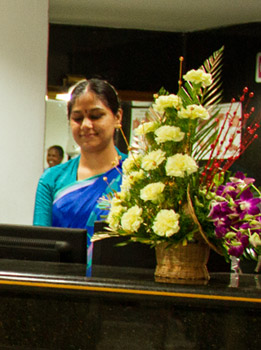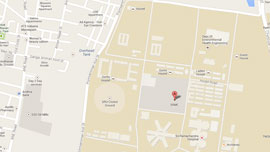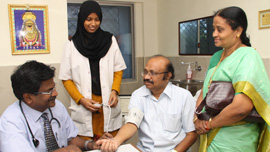Sri Ramachandra Medical Centre
Kidney Stones in Children
Dr. Ramesh Babu, MS, MCh, FRCS,
Paediatric Urologist,
Sri Ramachandra Medical Centre (DU),
Porur, Chennai.
The author can be contacted at 9841112568 (or) [email protected]
There is a wide misconception that only adults develop stones. On the contrary kidney stones are very common in children living in hot climates.
How is a stone formed in urine ? Urine is basically made of unwanted salts in the body. Presence of a reasonable amount of water is essential to prevent stone formation. When the water content is less, the urine becomes concentrated and favours stone formation. Also stagnation to urine flow promotes stone formation. Some children with stones have birth defects that make them pass more calcium and less citrate in urine. Children with recurrent urine infection are more prone to develop stones; stone in turn promotes urine infection.
What are the symptoms of urine stones ?
- There can be no symptoms when a stone is present.
- When a stone is blocking urine passage in the kidney or urinary tubes, severe loin pain results.
- When there is a stone in the urinary bladder, there will be pain at lower part of belly or the penis.
- Pain when passing urine, blood in urine or even passing small stones or gravel can be present.
- Small babies can't tell these. When children cry while passing urine or when there is urine infection, it is essential to rule out a stone.
How is a stone detected ? When children experience the above symptoms, urine is tested in the lab. Presence of excess red cells or white cells; and presence of crystals in the urine suggests urinary stone disease. Ultrasound scan helps to find out whether there is a stone, the position, size and number of stones. In addition special tests like IVP, X-Ray, or CT scan may be required.
What are the treatments available to remove the stones ? There is a general misconception that childhood stones always require open surgery. Like adults children also can be treated without open surgery. In modern medicine facilities are available to break stones and 80% are removed without open surgery. For this it is essential to consult a pediatric urologist trained in this field.
What is endoscopic treatment ? When stone is present in the bladder, it can be removed with the help of an endoscope. Endoscope is a small tube with a camera that is passed up via the urinary passage. The stones are grasped with small grabbers. Bigger stones can be broken with the help of a technique called lithotripsy. As children won't stay still, they need a general anaesthesia. To prevent blockage by broken stone pieces, a small tube called stent is left in for 2-3 weeks.
Breaking Stones. A technique called ESWL uses sound waves to break stone. With the help of an x-ray or a scan the stone is focused. ESWL machine breaks the stone in less than an hour. Sometimes a second sitting may be required for complete stone clearance. With this treatment, children can return home within a couple of days. Small children need general anaesthesia, as they have to lay still for this.
Can stones come back? How can we prevent this ? Children have a 20-50% higher chance for the stone recurrence. Problems like passing excess calcium in urine can be there. It is essential to identify this to prevent further stone formation. Regular toileting and drinking plenty of water are essential to prevent stones and urine infection.
What are the dietary restrictions in children with stones ?
- In general drinking plenty of water (10-20 cups) helps to reduce stone formation.
- Salt should be restricted in the diet.
- Non vegetarian foods and milk products need to be reduced.
- Cabbage, spinach, cashew, walnut, etc. need to be avoided.
- Coffee, tea, cola, apple and grape juices need to be restricted.
- Orange and lime juices are good.
- Vitamin D and calcium tonics should be avoided.
Key Points
- Like adults, children can also develop urinary stones.
- Children can have underlying medical problems that make them prone to develop stones.
- It is essential to identify and treat these to prevent stone recurrence.
- With the advent of newer facilities, 80% of stones in children can be removed without open surgery.
- It is essential to consult a paediatric urologist trained in this area to obtain the appropriate treatment.














